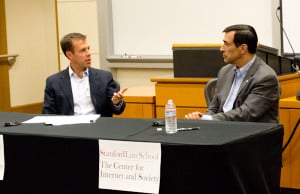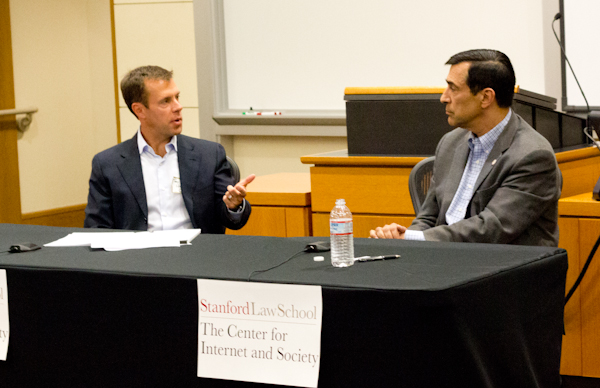Congressman Darrell Issa (R-Calif.) engaged in a public conversation Monday evening with Anthony Falzone, director of the Fair Use Project at the Center for Internet and Society (CIS), on the broad subject of Internet freedoms and intellectual property. The event, entitled “SOPA, PIPA and Internet Freedom: Where Do We Go From Here?” was held at the Law School in front of a crowd of mostly graduate students and faculty.

Honing in on the heavily opposed Stop Online Piracy Act (SOPA) and Protect IP Act (PIPA), which failed in the U.S. Senate and House, respectively, Issa discussed the need for unambiguous laws in this domain.
Issa, chairman of the House Committee on Oversight and Government Reform, weighed in on SOPA and PIPA, both of which he vocally opposed. Articulating his primary concerns against the laws, Issa claimed that the legislation was “too loosely written” and exhibited an unreasonable “expansion of individual and judicial power.”
When asked by Falzone about the introduction of the bills in Congress, Issa said that many thought the law would pass, and the defeat was a surprise to many in Congress. The legislation’s conception, he said, was lacking in intelligence, transparency and precision.
Issa detailed the strategy against the law as “stalling for time, and making it radioactive,” citing the work of a number of legislators, most significantly Rep. Jason Chaffetz (R-Utah).
Explaining the key factors that derailed SOPA and PIPA, Issa reflected on what he saw as the most important criticisms levied against the bills: Domain Name System (DNS) blocking and a stifling effect on innovation.
“The law would have basically shut off the innovation created in a 20-square mile radius of right here,” said Issa, referring to Silicon Valley.
On Jan. 18, more than 7,000 websites issued “blackouts” in protest of the two bills. Issa credited the multitude of websites that protested the bills as sounding their death knell.
He proceeded to discuss his own alternative, the Online Protection and Enforcement of Digital Trade (OPEN) Act, which he claimed would more effectively address the online piracy debate.
“We have to make legislation as surgical and as minimal as possible to diminish the unintended consequences and the excesses large, loose laws create,” Issa said.
Issa also described his ‘Madison’ program, a crowdsourcing platform that “integrates comments and suggestions from the people at each step of the legislative process.”
He described his vision for the legislative process as one in which laws are presented as working documents to be transparently viewed and critiqued as they evolve, although he admitted the difficulties of achieving such a goal.
Issa maintained that the “significant challenges we face in the area of Internet legislation” are the result of a tax structure that balances legitimate ends against the “arbitrary creation of taxes by government to raise funds,” stifling “innovative businesses.”
In response to audience questions, Issa continued to assert his support for minimal, but effective government regulation. He also stressed the importance of reaching a consensus, conducting gradual change and creating transparent, open government.
“The talk left me less cynical about the nature of politics,” said Josh Horowitz, a first-year Ph.D. student who attended the event. “Hearing a congressperson speaking for the first time was a humanizing experience and removed quite a few prejudices I had about legislators and the process as a whole.”
